December 2024
It’s the most wonderful time of the year.
In addition to the requisite festivities, it’s a window we use to reflect on our work that moved the proverbial needle.
We're celebrating the stories that resonated most with you, dear reader.
8-minute read time
GRAND OPENING
A New Frontier in AI Assurance
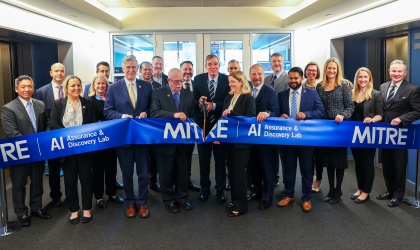
Picture caption: U.S. Sen. Mark Warner and members of the Virginia congressional delegation attended the AI Assurance & Discovery Lab opening in March.
AI continues to be top of mind for a range of professionals from industries across the board. As catalysts for the advancement of AI—50 years and counting— MITRE is well positioned to help keep the rapid technology in check. Our new AI Assurance & Discovery Lab is tackling the tall order by asking tough questions, including: How can we trust AI to do what it should, when it should? What are acceptable levels of risk?
What’s next: The effort will serve as a ‘blueprint’ for a national network of AI assurance labs.
SETTING SIGHTS HIGH
All Eyes on South Korea’s Transportation Transformation

*In our Jetsons era.* With MITRE’s help, the South Korean city of Incheon is setting the standard for the next generation of transportation networks via Advanced Air Mobility (AAM). The flexible aviation technology uses electric or hybrid propulsion and automation to make transporting people and cargo more accessible and environmentally friendly.
Due to its geography, dense population, urban sprawl, and proximity to a hostile neighbor, Incheon’s complex airspace constraints served as an ideal use case, says Michael Guterres, Ph.D., a leader of MITRE’s AAM and uncrewed aircraft system portfolios.
Read: If it can be done here, it can be done anywhere.
Why it matters: Cities around the world can apply Incheon’s rubric to their own networks, especially in locations where air travel is currently unavailable.
TRADING PLACES
Teachers Became Students at BlueTech Workshop
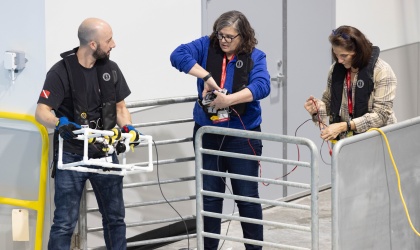
Our oceans represent Earth’s last, great, unexplored mystery. One of the biggest challenges we face involves training experts who want to change that. Earlier this year, MITRE and a national maritime education organization hosted a workshop in our Bedford, Mass., office where local teachers sliced and diced PVC piping and pool noodles to construct underwater robots. They then deployed their masterpieces in our BlueTech Lab’s 620,000-gallon test tank.
“Teachers are the force multipliers,” explains Marine Advanced Technology Education’s Jody Patterson, who co-hosted the workshop with MITRE.
The goal: Bring enthusiasm from the hands-on experience back to their respective classrooms.
Why now? Climate change, the decline of fisheries, and the overall degradation of our ecosystems underscores the need for skilled technologists in the BlueTech space. Getting young people interested is important “because they’re going to be the ones who innovate solutions to the challenges we face today and tomorrow,” says Patterson.
ENABLING EQUITY
Improving Telecommunications for the Deaf Community
Ringing a friend. Hopping on a work conference call. Connecting with a doctor. Most of us use our cell phones for daily communication, without a second thought. But for Americans who are deaf, or hard of hearing, making routine calls can pose major challenges.
The Americans with Disabilities Act of the 1990s requires telecommunications service providers to make it as easy for a deaf person to make a phone call as it is for a non-deaf person. To accomplish that, industry vendors, with oversight from the Federal Communications Commission (FCC), provide three-way call services with American Sign Language representatives. But call failures, system lags, and other technical problems can impact call quality and viability.
Ensuring calls work for every caller, every time: Enter our McLean-based team at the FCC’s National Test Lab who make up to 24,000 test phone calls per quarter to troubleshoot technical problems and analyze data to ultimately help providers improve their platforms.
Why it matters: In a word: equity. More than 48 million Americans who are deaf or hard of hearing rely on these services.
WHO’S NEXT
Visually Impaired Intern Goes Deep on Quantum
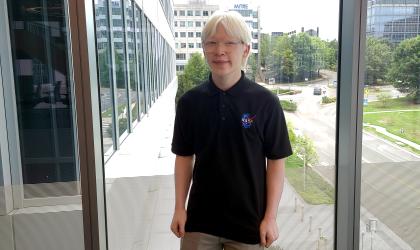
Along Kenny Calhoun's journey from a remote Chinese orphanage to the College of William & Mary, he adapted to his blindness and charted a path for his future. The physics and computer science major joined MITRE’s internship program this past summer and helped write code for a superconducting quantum interference device to sense magnetic fields at the quantum level (translation: write code to help sensors find needles in subatomic-level haystacks).
Sky’s the limit: “This experience has helped me reaffirm what I want to do, and I'm not going to let anything stop me,” Calhoun says.
DISPATCHES FROM LEADERSHIP
Executives For Growth and Inclusion
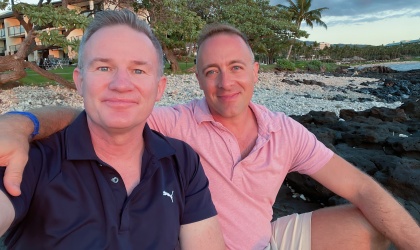
Since Mark Peters took the helm as our 10th CEO in September, he’s emphasized: “growth is not a strategy, it’s an outcome.” Growth is also a theme Kevin Toner, executive vice president of our Center for Government Effectiveness and Modernization, alluded to in his Pride month feature.
Decades ago, while serving in the Air Force, Toner hid a photo on his desk of his then-partner, now-husband. In recalling his experience with the military’s “Don’t Ask, Don’t Tell” policy, he notes: “No one can achieve their full potential if they can’t live an authentic life.”
Now, that same photo is featured front and center in his office, a symbol of how far we’ve come as a nation.
Growth matters: Our leadership is proud to be part of MITRE’s “growth curve” supporting an inclusive work environment.
HACKING FOR GOOD
Cyber Volunteers Fight Child Exploitation Online
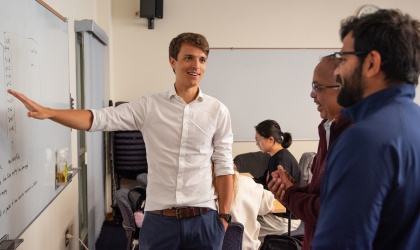
Most of the cyber work we do for law enforcement behind the scenes is hush hush (see our recent profile on cyber forensics effort Kevin Fairbanks for more on that). But, as cyber engineer Adam Hammond recognized, the skills we use to catch bad guys online are transferable. He and colleagues launched a volunteer effort coined “Hackathons For Good” collaborating with universities on behalf of nonprofit organizations combatting the exploitation of children online. There have been five successful events this year.
“MITRE engineers have the expertise where they can come in, work with students, and do in a single day something these organizations would take months or even years to fund and create,” he says.
All hands on deck: The U.S. Department of State estimates 27.6 million victims are trafficked worldwide at any given time—bleak figures exacerbated by advanced technology and ubiquitous internet connectivity. According to the National Center for Missing & Exploited Children, reports of child sex abuse material online have shot up 15,000% over the last 15 years. It’s an all-hands-on-deck situation. To get involved in future hackathons, email Hammond at ahammond@mitre.org.
WE’RE HIRING

Join our talent community of innovators, learners, knowledge-sharers, and risk-takers. Check out opportunities to amplify your impact for public good.